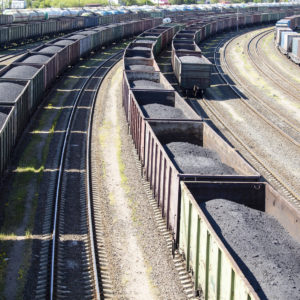It may be an off-year election, but energy is set to be on the ballot in a big way this fall in Spokane, Washington. Proposition 2 would make it illegal for railroads to ship uncontained coal and certain types of oil by rail through the city or within 2,000 feet of a hospital, school, or the Spokane River. The expansive ban would significantly raise the cost of shipment in an important northwest transportation corridor. Not only that, opponents of the measure say that it is likely unconstitutional and predict that attempts to defend the measure in court will drain city finances.
“I am against Proposition 2 because, in my understanding, it is illegal to toll or fine interstate commerce under the U.S. Constitution’s Commerce Clause. Even the city’s legal counsel has said that this is illegal, unconstitutional, and unenforceable,” said Matt Ewers, senior vice president at Inland Empire Distribution Systems.
Ewers is a member of the Committee to Protect Spokane’s Economy, a coalition of local labor, agriculture, business and trade groups who believe that rail is essential to the region’s economy and that Proposition 2 would negatively affect city finances, jobs, and the area economy. Ewers explained that his company used a variety of modes to transport freight around the Pacific Northwest and the proposed policy would be detrimental to the industry. Proposition 2 would fine rail car owners $261 per car for each violation. This would quickly make shipping through the city economically unfeasible.
Proposition 2 supporters say that stopping fossil fuel shipments through the city will improve public safety. They specifically point to a train derailment outside of Mosier, Ore. last summer that burned overnight and led to groundwater contamination, though no fatalities.
“It’s balancing safety and the needs of all parties. Right now, these dangerous oil cars go through Spokane and we don’t get any benefit from it and we accept the safety risk. We’re just saying that’s great if you want to ship oil through, but make sure it’s safe before you do,” said City Councilmember Breean Beggs, one of Proposition 2’s key supporters.
Others are not so sure that Proposition 2 is the best method to accomplish the goal. For one thing, the text of the measure would make shipping either coal or oil a fineable offense, without distinguishing between the two fossil fuels. Opponents of the ballot measure say that it is a political statement against fossil fuels disguised as a safety measure.
“Supporters haven’t been honest,” said Spokane County Sheriff Ozzie Knezovich. “They want to make this a safety issue. If so, coal cars wouldn’t be a part of this. When a coal train derails, a bunch of rocks fall on the ground.”
In addition, without the rail cars, oil would likely be shipped by truck, exacerbating congestion in the city, increasing the risk of accidents, and leading to more wear on the roads.
“The alternative [method of shipment] is by truck and one train carries the same as 300-400 trucks,” said Ewers. “Without trains, all that traffic would be added to roads, leading to increased wear and tear and more congestion.”
The Committee to Protect Spokane’s Economy is concerned that even if the law never takes effect, it could still have negative impacts on the city’s economy. Without reliable access to rail transportation, investment in the city would likely decline, leading to a decline in jobs as well.
“We are concerned about the environment, but we also need to look at the impact [of this policy] and the alternatives,” said Steve Warren of the International Association of Machinists and Aerospace Workers, District 751. “There is always an effect directly on local jobs.”
Another major concern is the legality and enforceability of the measure. The federal government has sole authority to regulate commerce between states. A city ordinance on rail transit would likely run against common carrier laws and it remains unclear what power local law enforcement officials would have to enforce the measure. Should voters pass the measure, all of these questions would likely be hammed out in court.
“It’s going to have an impact on law enforcement, particularly at the city level,” said Knezovich, who pointed out that the city already lacked the funding to hire an additional 40 officers that the department needs. “The money spent fighting lawsuits on this proposal is money we can’t spare,” he continued.
When Spokane’s City Council voted in late July to put the measure on the ballot, many in the city government were already questioning its legality. Both the city’s hearing examiner and City Council policy advisor spoke out against the proposal before the vote. While the measure is moving forward, the city is also bracing for its finances to take a significant hit should the measure be challenged in court. The consensus view is that the legal challenge would be more a question of when, rather than if.
City Councilman Mike Fagan, who cast the sole vote against the ballot proposal, introduced measures to include in the ballot measure language asking voters to set aside money from the general fund against the expected legal challenges, describing Proposition 2 as a “train wreck.”
Spokane’s mayor, David Condon, has also spoken out against the measure, saying in a statement after the city council vote that Proposition 2 “sets the city up for significant, costly legal challenges that would divert already limited resources from programs and initiatives focused on areas that this attempts to address.”
A similar proposal was introduced last summer and set to appear on the ballot in the fall of 2016. However, after hearing from the council’s policy adviser, Brian McClatchey, and students at the Gonzaga Law School, City Council President Ben Stuckart moved to withdraw the proposition from consideration. In a 5-2 vote, the council reversed a unanimous decision it had made merely three weeks earlier, with former supporters saying that they no longer believed that the city policy would be enforceable.

